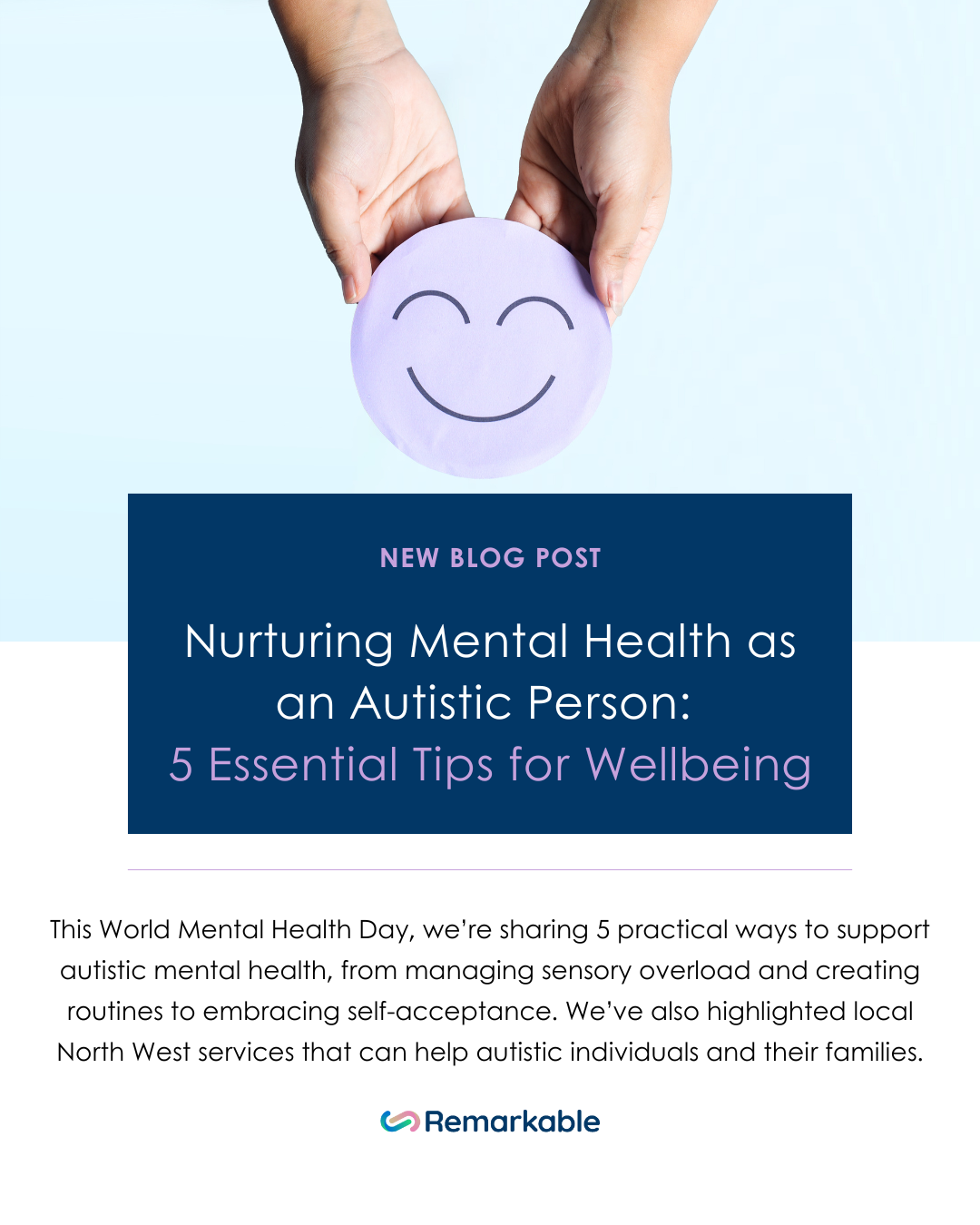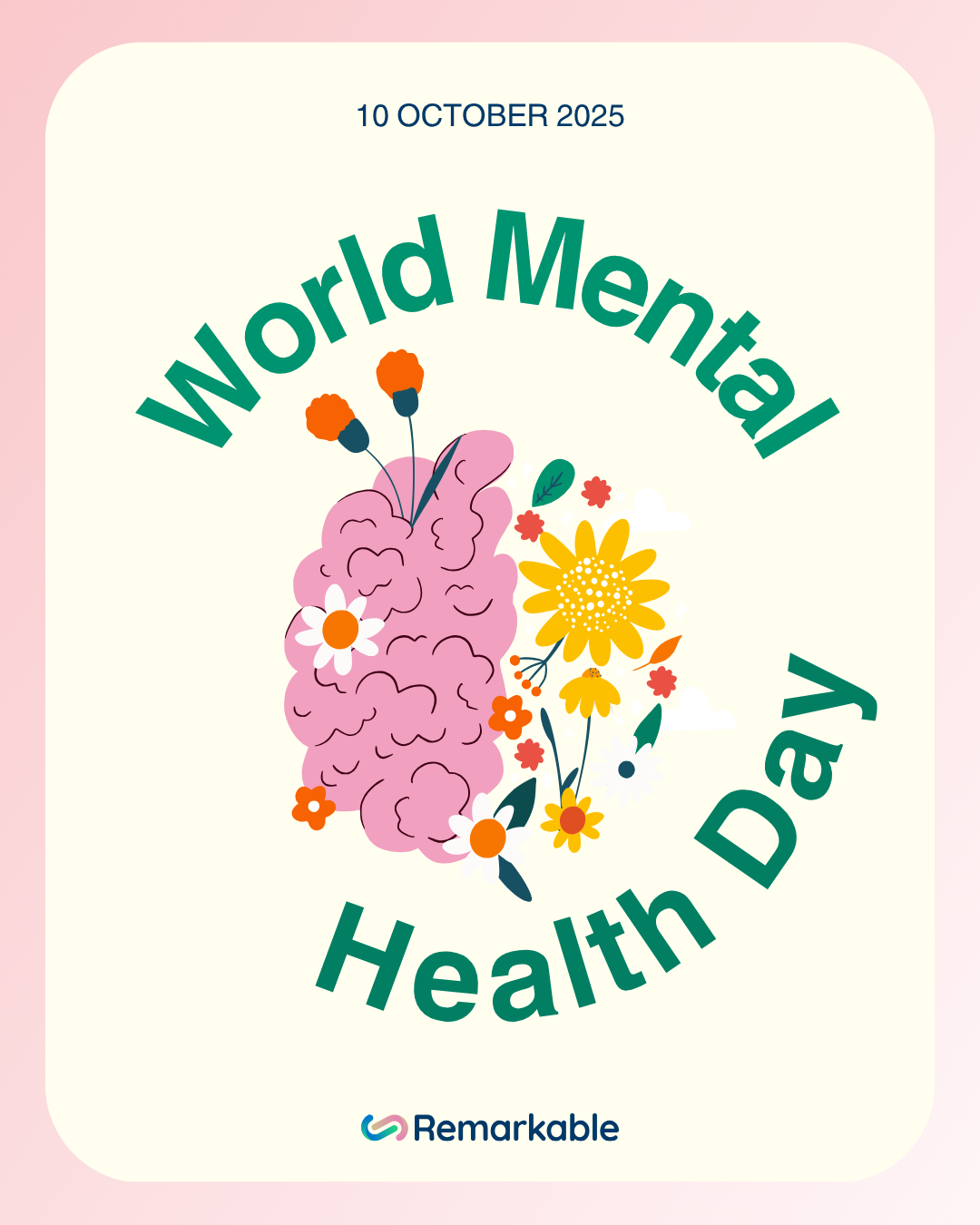
In honour of Mental Health Day this month, we’re sharing essential tips for autistic wellbeing!
Autistic individuals often face unique mental health challenges, from sensory overload and burnout to social pressures and masking. Yet, with understanding, structure, and self-compassion, it’s absolutely possible to nurture strong mental health and live authentically.
In this blog, we’ll explore five of the most important ways to support your wellbeing if you’re autistic (or supporting someone who is).
1. Recognise and Respect Your Limits
Autistic burnout is more than just feeling tired – it’s a deep exhaustion that can affect energy, emotions, and daily functioning. It often happens after long periods of masking, stress, or sensory overload. Learn to spot the early signs: increased irritability, fatigue, withdrawal, or losing interest in things you usually enjoy. When this happens, it’s essential to slow down, rest, and lower expectations. Taking breaks and saying “no” when you need to isn’t a weakness or selfish, it’s vital self-care.
This is especially important because autistic people often feel pressured by external expectations. As one autistic individual shared:
“I have to mask all of the time to be accepted by people around me and that has led to such trauma and mental ill health.” – Autistica
By listening to your limits early and acting on them, you help protect yourself from burnout before it becomes overwhelming.
2. Honour Your Sensory Needs
Your sensory system is part of who you are. Understanding what triggers or calms you can make a huge difference. Bright lights, background noise, or strong smells can cause distress, while soft lighting, or quiet spaces might help you recharge.
One person shared “I find sound very challenging as an autistic person. I don’t like to visit loud places … as it increases my stress levels.”- Autistica
Don’t be afraid to adapt your environment or wear noise-cancelling headphones, use fidget items, or create a calm corner at home. Meeting your sensory needs helps protect your emotional balance.
3. Practice Self-Acceptance
One of the biggest mental health boosts for autistic people comes from embracing, not hiding, who you are.
Society often pushes autistic individuals to “fit in” through masking, but long-term masking can lead to exhaustion and low self-esteem.
As one adult reflected:
“The saddest thing for me as a late-diagnosed person is that I spent 35 years feeling like everything was my fault. I’m sad for the person I was as I should never have been made to feel like that for being different.” – Autistica
Autistica describes masking as “exhausting” and notes that many autistic people employ it to conform socially, yet it often contributes to poorer mental health.
Remember: your brain works differently, not wrongly. Celebrate your strengths – your honesty, deep focus, creativity, and brilliant way of thinking. Self-acceptance is a powerful medicine for the mind.
4. Connect with Supportive People
Connection is vital for mental wellbeing, but not all social spaces feel safe or understanding. Seek out friends, family, or online communities where you can be yourself without judgment.
Autistic-friendly spaces (such as support groups or online communities) can provide validation, belonging, and understanding. Remember, it’s okay if your social circle is small – quality matters more than quantity.
5. Build a Routine that Includes Rest
Predictability can bring peace of mind. Creating a daily or weekly routine can help reduce anxiety, but don’t forget to schedule rest and decompression time.
After social events, work, or sensory-heavy days, give yourself permission to recover. Balance structure with flexibility – routines should support you, not trap you. Your mental health thrives when you have time to recharge.
Supporting Autistic Individuals as a Parent / Carer
Parents play a crucial role in nurturing their child’s mental health. Here are some ways to help:
- Understand and respect your child’s sensory and social needs: Provide quiet spaces, reduce sensory triggers, and allow downtime.
- Encourage self-expression: Support stimming, special interests, and emotional expression without judgment.
- Advocate for them: Work with schools, therapists, and community programmes to ensure your child’s needs are seen and met.
- Model self-care: Show your child that rest, boundaries, and self-acceptance are important.
- Build connection: Spend quality time doing activities they enjoy and listening to them without pressure to conform or mask.
By fostering a supportive, accepting environment, parents can help their autistic children and young people build resilience and a healthy sense of self.
Final Thoughts
Looking after your mental health as an autistic person means understanding your needs, setting healthy boundaries, and practising kindness toward yourself. Whether it’s through rest, sensory regulation, or connecting with others who understand, every small act of self-care builds a stronger foundation for wellbeing.
Remember: you deserve to rest, self-kindness and to be understood without wearing a mask – exactly as you are.
Getting Outside and Staying Active
Spending time outdoors is fantastic for mental wellbeing. Fresh air, movement, and nature can help reduce stress, improve mood, and boost energy.
We also have a selection of events you can get involved with – whether you want a challenge, a fun activity, or just a reason to get moving. For example, we’re running the Manchester Marathon and other activities throughout the year. If you want something to work towards, click here to see upcoming events.
Mental Health & Autism Support Services in Northwest England:
- National Autistic Society: Offers guidance and mental health resources for autistic individuals and families. (autism.org.uk)
- Mind: Provides mental health advice, support, and services suitable for autistic individuals experiencing anxiety, depression, or other mental health challenges. (mind.org.uk)
- YoungMinds Parents Helpline: Confidential support for parents worried about their child’s mental health, including for autistic children. (youngminds.org.uk)
- Lancashire and Cumbria Autism Support Hub: Offers advice, guidance, and support for autistic children and adults, helping families manage stress and access mental health services. (lancashire.gov.uk)
- Cheshire Autism Practical Support (APS): Provides specialist counselling, wellbeing support, and parent support to improve mental health outcomes for autistic children and adults. (cheshireautism.org)
- NHS Five Steps to Wellbeing: https://www.nhs.uk/mental-health/self-help/guides-tools-and-activities/five-steps-to-mental-wellbeing/
- Kooth: https://www.kooth.com/
- Hub of Hope – The UK’s largest mental health support directory: https://hubofhope.co.uk/
References
Autistica (2024). Challenges autistic people face. Retrieved from autistica.org.uk
https://www.autistica.org.uk/what-is-autism/challenges-autistic-people-face
